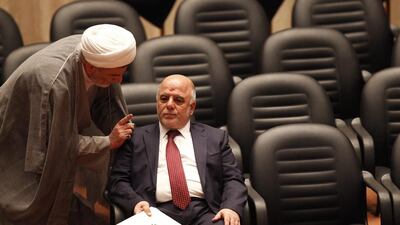BAGHDAD // Iraq’s new prime minister, Haider Al Abadi, has a daunting task ahead of him: unifying a deeply divided country against Sunni extremist militants who have seized much of its territory.
First, though, the Shiite prime minister must find officials to run the defence and interior ministries who will be acceptable to Iraq’s parliament, which approved his cabinet on Monday except for those positions along with a few lesser posts.
The lightning advance by ISIL militants across much of northern and western Iraq has driven hundreds of thousands of people from their homes since June. It prompted the US to launch aid operations and airstrikes to boost the efforts of Iraqi and Kurdish forces looking to regain control of lost territory, including five more strikes on Monday and Tuesday to protect the Haditha Dam.
The success of outreach efforts to Iraq’s alienated Sunni minority will be a key part of international efforts to beat back ISIL, who also control parts of neighboring Syria.
Addressing MPs, Mr Al Abadi said the central government, which includes all major religious and ethnic groups in Iraq, must make sure that cities and provinces have enough money to deliver basic services. He also emphasised the need to provide housing and education to more than a million people displaced by the militants’ advance.
Like many positions in the Iraqi government, the job of defence minister has, in recent years, traditionally been assigned to a Sunni, while the interior minister has been a Shiite. Some MPs say the country is at too critical a juncture to put so much emphasis on sect.
“I have fears that the vacant posts, mainly the defence and interior, will be run without ministers or be given to persons affiliated with political parties instead of to people who are independent and professional,” said Hamid Al Mutlaq, a Sunni MP from Anbar province.
Mr Al Mutlaq called on Mr Al Abadi’s government to “prove its credibility and good intentions”.
Salim Al Muslimawi, a Shiite MP, said any further delay in filling the posts risked making the government appear weak and divided. He called the generally rapid selection of the other cabinet ministers “a positive step in tackling the many problems facing the country”.
Another Shiite MP, Walid Al Hili, said Mr Al Abadi had the names of independent Sunni and Shiite candidates for both posts on Monday, but “didn’t want to submit them without a national consensus ... He’ll submit them in the coming few days – no more than a week.”
Mr Al Abadi has yet to formally nominate anyone for the defence and interior posts, unable so far to find a consensus choice in discussions with various parliamentary blocs.
Mr Al Abadi became prime minister on August 14, ending a political deadlock that had plunged the country into uncertainty as it fights the Sunni militant insurgency. He succeeds Nouri Al Maliki, Iraq’s prime minister for the past eight years.
The United States and other countries have been pushing for a more representative government that will ease anger among Sunnis, who felt marginalised by Mr Al Maliki’s Shiite-dominated administration.
Sunni alienation helped fuel the rise of ISIL, which seized the country’s second largest city, Mosul, and routed Iraq’s beleaguered armed forces. Thousands of people have been killed and more than 1.5 million have been displaced by the violence.
Another issue is the country’s ethnic Kurdish population, which has long pressed for independence but is now joining Iraqi security forces to fight the Sunni extremists.
“We have a three-month timeline,” said Falah Bakr, the minister of foreign affairs for the semi-autonomous Kurdish Regional Government in northern Iraq.
“If there is political will in Baghdad, if they are for this genuine partnership and power sharing, and if they care for a better future for Iraq, then this is the way,” Mr Bakr said. “Either we share the power, or we cannot live together.”
* Associated Press

